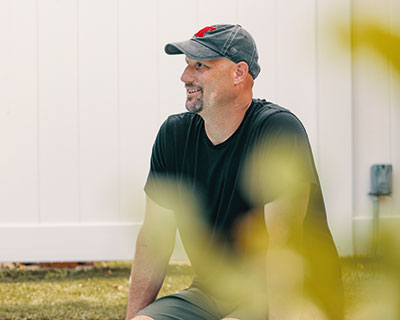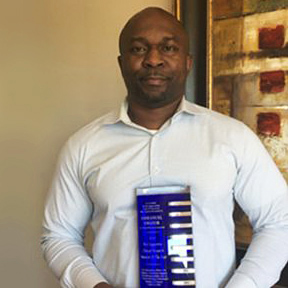Patient Voices: TJ's Story
T.J. Sharpe shares his experience battling melanoma and participating in clinical trials.
At the age of 25, T.J. Sharpe was diagnosed with melanoma, which was removed successfully. Years later, married and with two young kids, he learned his melanoma had returned with tumors in multiple organs. With the diagnosis he had two years to live, T.J. went on to participate in two clinical trials, undergoing six surgeries and four immunotherapy treatments ultimately leading to his remission. Today he remains cancer-free and has made it his mission to advocate for patient involvement in clinical trials.
Here is TJ’s story in his own words:
I thought my melanoma scare was behind me and went to the hospital for what I thought was a fever. My son had just been born and we thought it was the result of all the germs going around. I will never forget the ER doctor saying he thought it was a recurrence of my cancer.
Immediately, it became a fact-finding mission: X-ray, CT scan, targeted ultrasound, colonoscopy… It took almost an entire week to understand the depth of the issue — where my melanoma was, and what it was. Surgery to remove the tumors was successful, but more had spread to my lungs, liver, and spleen. My wife asked how much time I had left and the doctor said he would be surprised if I had two years.
At the time, there were limited options for clinical trials. After visiting four doctors, I was referred to an immunotherapy trial. I had two kids under three and I wanted to watch them grow up and be there for my family. We had to relocate and miss holidays for treatments but that’s the choice we made.
We were disappointed but determined when I did not have a positive outcome from the first trial. I kept fighting and was successful in finding another trial that achieved a successful outcome. Today I’m cancer free and have dedicated my life to advocating for patients like me who face the worst possible news.
The main lessons TJ shares are:
- We need to improve the clinical trial process for patients.
Paperwork and informed consents can hold up the process. At one point, I almost didn’t make it into a trial due to the time it took to get the trial’s contract signed by all parties. Many patients struggle, not just with informed consents, but also with things like exclusion criteria or even just getting to a site that has the trial they find online.
Finding the right trial and navigating through an online registry also can be a challenge. Trial details are written very clinically and aren’t necessarily easily understandable to someone who’s trying to find a trial and isn’t familiar with medical jargon or what certain markers mean.
- If you are given the choice, consider participation in clinical trials.
Every medicine available has had to go through a clinical trial. The clinical trial process is highly regulated, and very stringent with safety criteria. Clinical trials should be part of the conversation you have with any specialist or doctor. While there’s no guarantee something will work, clinical trials often involve cutting-edge science. The medicines you will take tomorrow or in the next year or in five years are the ones available in a trial right now.
- We must all work together to improve the future outlook.
Companies doing clinical research need to help educate physicians, as this is the group where patients place their confidence and trust. Patient advocacy groups can provide patients a better understanding of the full landscape of their disease. The challenge is the disparate number of patient resources; as a patient, it’s hard to know which ones to access. We can help to bring together trusted information that is easily understandable and accessible and enables patients to take an active role in their care and their future.
To learn more about T.J.’s experience, you can read his bio, visit his website and read his blogs.






